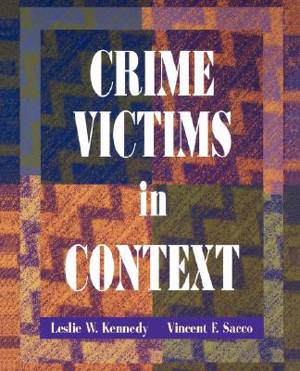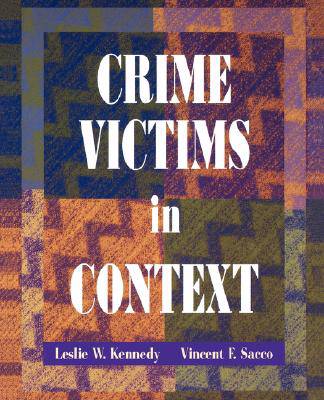
- Afhalen na 1 uur in een winkel met voorraad
- Gratis thuislevering in België vanaf € 30
- Ruim aanbod met 7 miljoen producten
- Afhalen na 1 uur in een winkel met voorraad
- Gratis thuislevering in België vanaf € 30
- Ruim aanbod met 7 miljoen producten
Zoeken
Omschrijving
This is the most up-to-date and thought-provoking undergraduate text on the controversial topic of victimology available. It features a lively, engaging writing style. Designed for the American college and university market, this book is groundbreaking in its integrated approach to the study of society's crime victims and the forces that influence their victimization. This approach eases instruction by encouraging students to engage in critical thinking about victims--helping students understand how victimization relates to the social context in which victims live. Crime Victims in Context explores the following themes: * Ways in which the victim role is constructed in the media, in public discourse, and in political responses to crime. This sets the stage for rethinking the meaning of victimization.
* Approaching victimization as a social event--the social exchanges, or transactions, between victim and offender.
* An exploration of the aftermath of crime--examining the effects of crime on the victim, including the physical and socio-emotional costs of victimization.
* Responses by the criminal justice system in the adjudication of offender guilt as well as victim support groups. Coverage includes both sides of such controversial issues as fear of crime, victim blaming, the "abuse excuse," white-collar victimization, and restorative justice. The discussion of culture and the discussion of victims and victimization as moral stratification are innovative features of this text. There is extensive treatment of victimization theories and a review of data-collection procedures used in collecting information about victimization. Numerous examples drawn from real life and recent research serve to illustrate points throughout the book. Internet references are also included.
* Approaching victimization as a social event--the social exchanges, or transactions, between victim and offender.
* An exploration of the aftermath of crime--examining the effects of crime on the victim, including the physical and socio-emotional costs of victimization.
* Responses by the criminal justice system in the adjudication of offender guilt as well as victim support groups. Coverage includes both sides of such controversial issues as fear of crime, victim blaming, the "abuse excuse," white-collar victimization, and restorative justice. The discussion of culture and the discussion of victims and victimization as moral stratification are innovative features of this text. There is extensive treatment of victimization theories and a review of data-collection procedures used in collecting information about victimization. Numerous examples drawn from real life and recent research serve to illustrate points throughout the book. Internet references are also included.
Specificaties
Betrokkenen
- Auteur(s):
- Uitgeverij:
Inhoud
- Aantal bladzijden:
- 240
- Taal:
- Engels
Eigenschappen
- Productcode (EAN):
- 9780195329773
- Verschijningsdatum:
- 1/01/1998
- Uitvoering:
- Paperback
- Formaat:
- Trade paperback (VS)
- Afmetingen:
- 190 mm x 235 mm
- Gewicht:
- 444 g

Alleen bij Standaard Boekhandel
+ 437 punten op je klantenkaart van Standaard Boekhandel
Beoordelingen
We publiceren alleen reviews die voldoen aan de voorwaarden voor reviews. Bekijk onze voorwaarden voor reviews.











